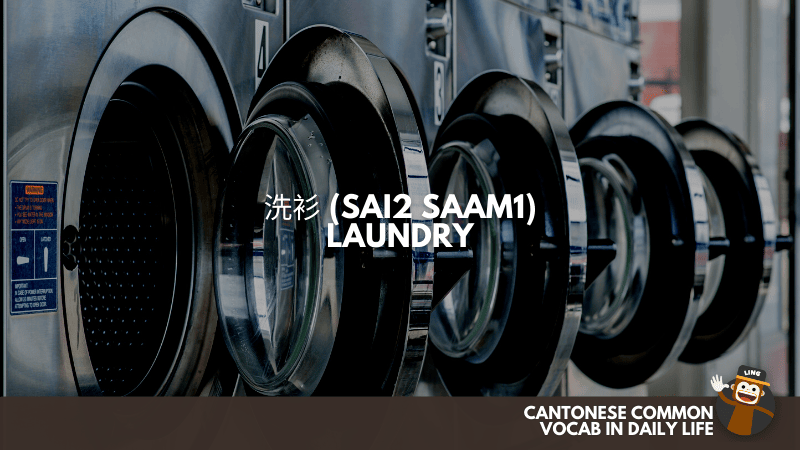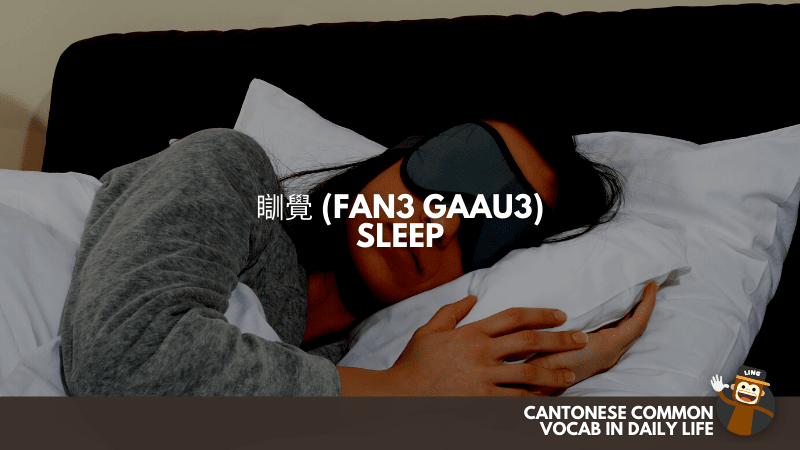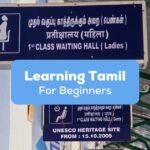What’s your daily life routine? If you wanna live a Hong Konger style of life, learn this Cantonese common vocab in daily life starting from 床 (cong4).
Visiting Hong Kong and getting to experience their culture is an amazing experience. But, living with them for a long time is another level. Your everyday life will be totally different compared to what you are used to. There are lots of things to learn, and one of them, of course, is Cantonese vocabulary in daily life.
Cantonese is the main language spoken in Hong Kong; that’s why if you’re planning to spend a long time in this country, you should start to learn Cantonese. Most of them can speak English but learning Cantonese, especially conversational Cantonese will be really helpful. You can start with Cantonese greetings and, of course, these Cantonese common vocab in daily life.
So, prepare yourself for this short but very helpful lesson. If you’re new to learning Chinese languages like Cantonese, d not worry because English translation for Chinese characters will be provided. Romanizations will also help you with Cantonese pronunciation so let’s start learning Cantonese common vocab in daily life.
Cantonese Words In Daily Life
Chinese languages like Cantonese can be too challenging for beginners. You might also encounter other Chinese languages like Mandarin, but if you are staying in Hong Kong, Cantonese is the one to go.
Cantonese uses traditional Chinese characters, and there are differences between the written form and spoken Cantonese. That’s why it’s really important to in the right foot when you’re learning Cantonese. Carefully choose resources and the first set of essential vocabulary because it can be frustrating at first. Here is an example of essential vocabulary you should start with – common vocabulary in daily life. This is important, especially when you wanna have a conversation with a native speaker.
起身 (Hei2 San1) – Wake Up
Sample Sentence: 我朝早七點起身。(ngo5 ziu1 zou2 cat1 dim2 hei2 san1.) – I wake up at 7 a.m.

Let’s start this list of Cantonese common vocab in daily life by how we start the day, waking up 起身 (hei2 san1). Learning how to say Good morning and other greetings is also nice. If you have managed to stay in a nice accommodation in Hong Kong, you’ll have a chance to see the amazing skyline upon waking up.
Hong Kong is a late city. The shops do not open until late morning, so if you’re an early waker, make your morning productive doing house chores, checking emails, or at least taking a morning walk.
床 (Cong4) – Bed
Sample Sentence: 我落床。(ngo5 lok6 cong4.) – I get out of bed.

Did you know fixing your bed 床 (Cong4) every time you wake up in the morning is already an act of productivity? Accomplishing simple tasks in the morning will push you to achieve more tasks during the day. It gives you a sense of responsibility to complete even simple tasks. When your mind is trained like this every day, there are more activities that you can be done.
早餐 (Zou2 Caan1) – Breakfast
Sample Sentence: 我食早餐。(ngo5 sik6 zou2 caan1.) – I eat breakfast.

The next vocabulary is breakfast 早餐 (zou2 caan1). In Hong Kong, there are all-time breakfast favorites such as macaroni soup with salted meat, toast, classic ‘western’ fry up, milk tea.,congee, Gongzai noodles with fried egg and luncheon meat, and a scrambled egg sandwich.
Cheong fun.Some who are staying in bed like to have breakfast in bed 喺床上食早餐 (hai2 cong4 soeng6 sik6 zou2 caan1) while some go outside to have breakfast. Of course, there are a lot of restaurants that have the best breakfast menu in Hong Kong. Some of them are Luen Fat, Padstow Restaurant & Bar, and Chan Hon Kee. If you’re still not that good at Cantonese, then you might wanna ask for the English menu.
沖涼 (Cung1 Loeng4) – Bath
Sample Sentence: 我沖個熱水涼。(ngo5 cung1 go3 jit6 seoi2 loeng4.) – I take a hot bath.

The next vocab is the word bath 沖涼 (cung1 loeng4). Of course, this is definitely one of the most important parts of our daily routine. As a foreigner to land, make sure that before going out, you are well-groomed. This is really important especially if you’re up for business meetings.
In Hong Kong, there are actually a lot of bath products that locals use. These products range from affordable to high-end brands like Sephora, Bathe to Basics, Bath & Bloom HK, and Bath Concept Cosmetics (H.K.) Co., Ltd.
牙刷 (Ngaa4 Caat2) – Toothbrush
Sample Sentence: 我刷牙。(ngo5 caat3 ngaa4.) – I brush my teeth.

After eating delicious Cantonese food, make sure to brush your teeth. This is the reason why toothbrush is one of the most important Cantonese common vocab in daily life. Brushing your teeth is also an essential part of your hygiene routine to be presentable to others.
In Hong Kong, an electric toothbrush is also popular. In fact, there are lots of companies that sell electric toothbrushes like Philips, Oral B, and Foreo.
工 (Gung1) – Work
Sample Sentence: 我返工。(ngo5 faan1 gung1) – I go to work.

After all the getting ready routine, of course, another useful vocabulary is work. When it comes to work, Hong Kongers are really serious. Well, it is one of the Asian Tigers, and there are actually a lot of billionaires living there, so it’s not that surprising.
買餸 (Maai5 Sung3) – Buy Groceries
Sample Sentence: 我買餸。(ngo5 maai5 sung3.) – I buy groceries.

A week or month cannot pass without going shopping for groceries 買餸 (maai5 sung3). Groceries are important, especially if you’re living with your family. You don’t wanna be spending a lot of money on fast food and restaurants, right? So, you should consider putting buying groceries on your to-do lists.
Hong Kong has large grocery stores 雜貨舖 (zaap6 fo3 pou2) where you can enjoy shopping. Some of these grocery stores are Great Food Hall, SOGO Freshmart, city’super, Yata Supermarket, Marks & Spencer, and Just Green.
午餐 (Ng5 Caan1) – Lunch
Sample Sentence: 我煮午餐。(Ngo5 Zyu2 Ng5 Caan1.) – I make lunch.

Since Hong Kong is a late country, lunch is a big deal for them. This is an important part of our daily life routine. Most of the restaurants and fast-food chains are full and busy during lunchtime. Sometimes business meetings are also held during lunch. Some of the best lunch spots in Hong Kong are Amalfitana Central, Cruise, Sushi Shari, Tosca di Angelo, The Oyster House, and Burger Joys. While you’re in Hong Kong, do not forget to taste their tasty dim sum dishes.
洗衫 (Sai2 Saam1) – Laundry
Sample Sentence: 我洗衫。(Ngo5 si2 saam1.) – I do laundry.

Of course, we couldn’t miss talking about laundry. Laundry and other services such as dry-cleaning are very common in Hong Kong. Hong Kong is known for its quick, high-quality, and frequently low-cost laundry services. If you’re visiting or residing in that country, you won’t have to wash or dry your clothes unless you want to. There are different ways how you do your laundry. You can go to laundry shops, self-service launderettes, or just stay in your house and do it by hand or own a washing machine.
戲 (Hei3) – Movie
Sample Sentence: 我睇套新戲。(ngo5 tai2 tou3 san1 hei3.) – I am watching a new movie.

Of course, after a long tiring day or week, you deserve to binge-watch your favorite series or movie. Having a movie night is a way to relax. With a Netflix subscription, you can surely watch your desired movie or series anytime you want. As of March 18, 2022, the overall top 10 Netflix films in Hong Kong are:
- Business Proposal
- Juvenile Justice
- The Adam Project
- Forecasting Love and Weather
- Twenty Five Twenty One
- Formula 1: Drive to Survive
- Thirty-Nine
- Inventing Anna
- Crash Landing on You
- What’s Wrong with Secretary Kim
電腦 (Din6 Nou5) – Computer
Sample Sentence: 我開電腦。(ngo5 hoi1 din6 nou5.) – I turn on my computer.

This list of Cantonese common vocab in daily life will never be complete without learning the word computer 電腦 (din6 nou5). For a country as advanced as Hong Kong, computers are necessary. Whether it’s a laptop computer or a desktop computer, it would be helpful
瞓覺 (Fan3 gaau3) – Sleep
Sample Sentence: 我凌晨左右瞓覺。(ngo5 ling4 san4 zo2 jau2 fan3 gaau3.) – I go to sleep around midnight.

At the end of the day, what we all seek is a peaceful and comfortable sleep. Getting a nice sleep is very important, especially if you’re working. If you’re just visiting Hong Kong, there are different types of accommodations that you can avail yourself of just to sleep comfortably. But, if you’re a night person, you’ll surely enjoy Hong Kong’s nightlife.
More Cantonese Common Vocab In Daily Life
Want some more vocabulary in daily life? Learn these basic and useful phrases, sentences, and words:
Cantonese Words
Cantonese Phrases And Sentences
Speak The Cantonese Language Now!
Congratulations! You have finally reached this part of the blog because you’re in for a treat. After learning Cantonese common vocab in daily life, why not take one step forward and start learning Cantonese with Ling App? Imagine how great it would be to have dialogues with your Hong Konger friends in Cantonese?

If you wanna talk like locals, begin your Cantonese language journey with Ling App. With its advanced features and lessons backed with linguistic research, you’ll be able to achieve fluency in record time. So, grab your phone or computer and download Ling App now!


















